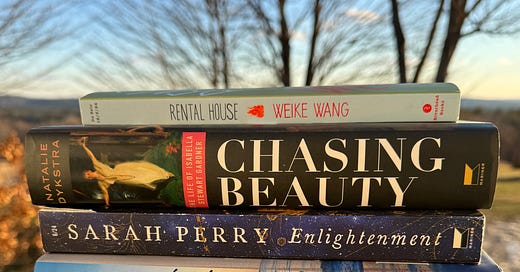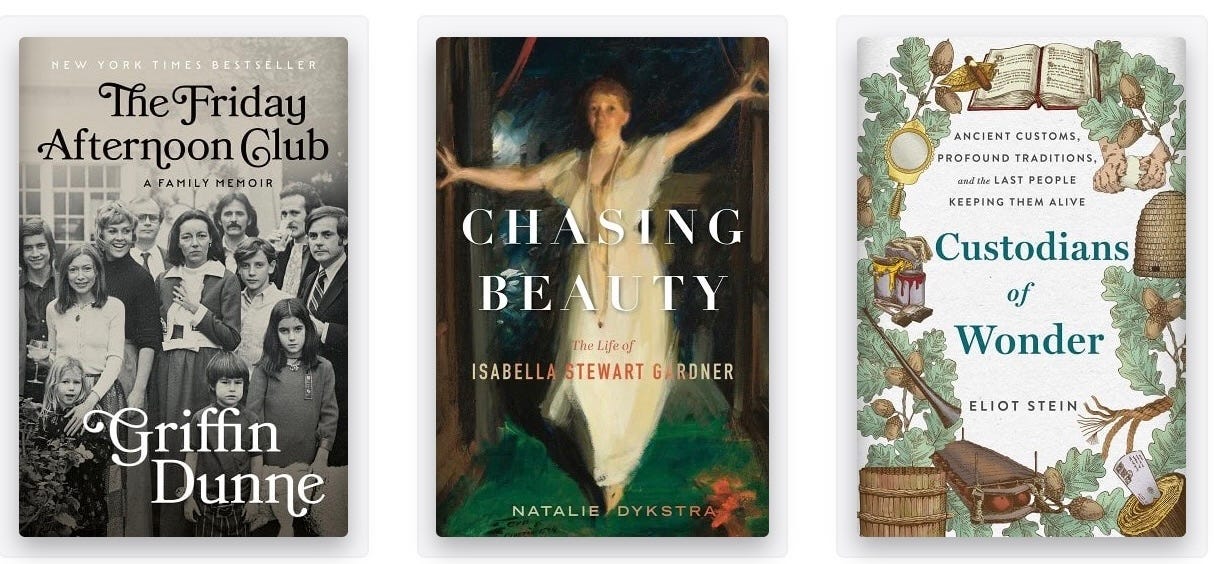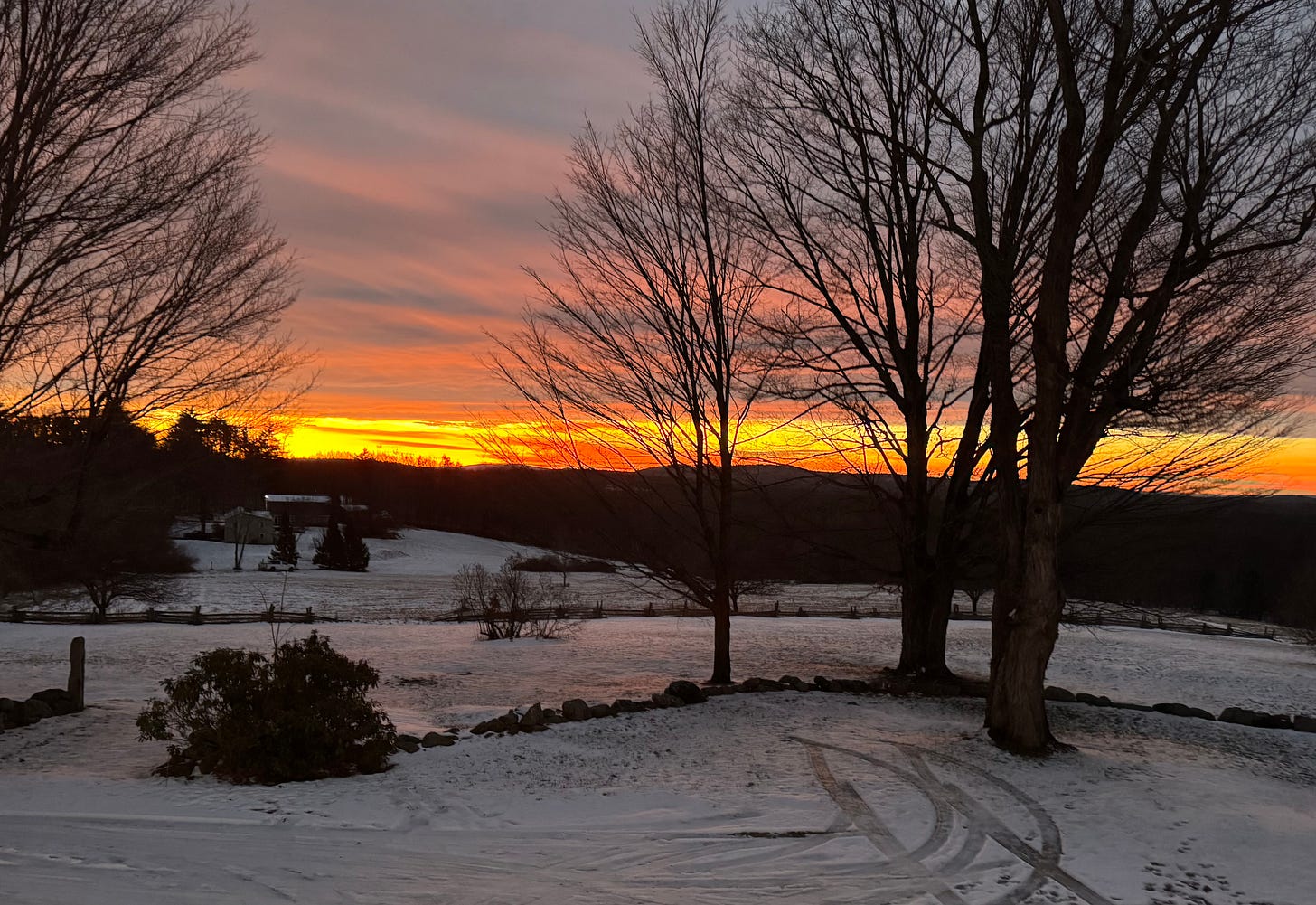It’s that time of year again, when the BEST BOOKS lists pop out all over. I bristle at the word best when applied to books, especially fiction. But I don’t mind the word favorite, which acknowledges how subjective our opinions are, instead of best (I also like the way NPR phrases it: Books We Love).
Tell me what you loved reading in 2024 (or what you didn’t love!)—add a comment below.
Some Favorites of 2024
James, Percival Everett
Percival Everett brings The Adventures of Huckleberry Finn’s enslaved supporting character, Jim, into the foreground of his new novel, James. Though James stays with Huck Finn’s characters, setting, and first-person perspective, it’s Jim, not Huck, who narrates this story. In an era of retellings, James stands out for staying true to Twain’s voice, tale-spinning talent and humor, while also accurately depicting what Twain failed to acknowledge: the reality of life for enslaved people. In revealing Jim’s humanity, deep thinking, and love through his hero’s journey, Everett has written a visionary reimagining. You don’t need me to tell you to read it, but read it. Here’s my review, in BookPage.
Long Island, Colm Toibin
The sequel to Tobin’s 2009 novel Brooklyn. Long Island is set 20 years after Brooklyn, with Eilis and Tony now parents to two teens and living in a suburban cul de sac with Tony’s parents, brothers, and brothers’ wives. Some surprising news upends Eilis and Tony’s relationship, and Eilis decides to return to the small town of Enniscorthy, Ireland, for the summer.
Like Brooklyn, Long Island is a short novel, but this new novel opens up the point of view to include Eilis’s old connections Jim Farrell and Nancy Sheridan. A lot of the same charm as Brooklyn, in Colm Toibin’s restrained style, but this time the story is even more about the power of what these characters are unable to say. If you haven’t read Brooklyn, read it first.
Rental House, Weike Wang
The story of a couple: Chinese American Keru and white Appalachian-born Nate, and their marriage, as they enter midlife. Rental House covers two vacations five years apart, one on Cape Cod and one in the Catskills, each time with extra family members. It’s a close observation of marriage and how we understand (and misunderstand) our partners’ family cultures, and often dryly funny. It’s also brief, only around 200 pages. But within this short space, the novel reports on a host of issues: the mingled comfort and uncertainty of marriage in midlife, the intricacies of class and culture differences, how one generation’s attempt to make a better life for their children can both inspire and infuriate the next generation, and what grown children and aging parents owe one another. Here’s my review, for BookPage.
This Strange Eventful History, Claire Messud
In contrast to the short and shorter Brooklyn and Rental House, Claire Messud’s latest novel is a long, multi-point-of-view, multi-generational story. The novel follows a French-Algerian family from the beginning of World War II to the the near-present. Over time, the different generations are displaced all over the globe, from Algeria to France, to South America, to Australia, to Canada, to the US, and back to France. This Strange Eventful History is based on the story of Messud’s own family, and on her grandfather’s memoir. It’s a rich, immersive novel whose characters, all of them flawed in different ways, feel real and present. I loved diving into this novel over the summer.
Enlightenment, Sarah Perry
Enlightenment opens on a late-winter Monday in 1997 in the office of the Essex Chronicle, a small newspaper in the English town of Aldleigh. Fifty-year-old Thomas Hart, who’s been quietly writing about literature and ghosts for decades, needs to write something new, his boss tells him, suggesting astronomy. That same day, Thomas receives a letter from the town museum with new information about the Lowlands ghost, who’s rumored to haunt the nearby Lowlands House, and who may be a 19th-century astronomer from Romania named Maria Vaduva. These two events will send Thomas on a quest to fill in the details of Maria Vaduva’s life and work. A novel that feels like it’s set in the mid-19th century, even though it’s set in the 1990s, with a hint of A.S. Byatt’s Persuasion—a literary mystery plus love stories. Here’s my review, for BookPage.
Tell Me Everything, Elizabeth Strout
Elizabeth Strout’s 10th novel, Tell Me Everything, brings together Lucy Barton, Olive Kitteridge and Bob Burgess from Strout’s previous novels, following their lives and others’ in the small town of Crosby, Maine.
Tell Me Everything traces the interactions between Bob and Lucy, who’ve built a friendship from their weekly walks along the river. They share confidences and old puzzling stories, and after Bob introduces Lucy to Olive Kitteridge, Lucy visits Olive in her assisted-living apartment, where they trade stories too. Olive plays a supporting role, but she voices one of the novel’s themes: “Everywhere in the world people led their lives unrecorded.” This novel also features a murder mystery, which adds a layer of dartkness and propels the story forward. Still, a very Stroutian novel. If you haven’t read Elizabeth Strout, don’t start with this one; instead, read Olive Kitteredge, My Name is Lucy Barton, or Amy and Isabelle, her debut novel.
The Volcano Daughters, Gina Maria Balibrera
Gina Maria Balibrera’s debut novel offers the epic early 20th-century tale of sisters Graciela and Consuelo, born into poverty and servitude on a coffee plantation on the side of a volcano in El Salvador. Balibrera brings a bravura, magical-realist style to this saga of resilience and love through impossible circumstances, with settings that range from Central America to Paris to 1930s Hollywood.
The Woman in the Sable Coat, Elizabeth Brooks
A noirish World War II story set in England. Elizabeth Brooks’ fourth novel follows two young women, Nina and Kate, connected by their love of the same man. But The Woman in the Sable Coat isn’t a typical story of plucky, cheerful British heroines making a difference to the war effort: Although World War II is at the center of the novel, and its period details are sharply etched, this is a darker, more Gothic-leaning story.
This novel flew under the radar, possibly because it was published in the US by small literary publisher Tin House; I think it’s worthy of a larger audience. Here’s my review, for BookPage.
The Cliffs, J. Courtney Sullivan
Sullivan’s latest novel follows Jane Flanagan, who’s returned to her Maine hometown, ostensibly to pack up her dead mother’s house, but really because in one terrible drunken night, she lost both her archivist job and her husband. She also returns to a youthful obsession, an old seaside house with a long history.
The Cliffs is midlife coming-of-age story, ghost story, the story of a house (somewhat in the vein of Daniel Mason’s North Woods), and the history of a place, with themes of grief, and coming to terms with your flawed family and your even-more-flawed self. It also delves into a range of characters connected to the house: a former Shaker, a mid-20th-century woman artist, a 17th-century Native American woman. An ambitious novel, a little too didactic in places, but a satisfying ending.
The Lion Women of Tehran, Marjan Kamali
A friendship saga: Ellie and Homa meet as schoolgirls in the poorest section of 1950s Tehran, and their friendship goes through ups and downs as Ellie’s fortunes change. Homa is set on being the first woman judge in Iran; Ellie is more conventional. The novel follows them through the next two decades, up to and beyond the Iranian revolution. I wanted more of Homa, but Ellie conveys their trajectory, and her own regrets and envy, convincingly. Kamali does a beautiful job with the mid-century Tehran setting and period details.
Plus three nonfiction favorites
Custodians of Wonder, Eliot Stein (narrative nonfiction)
“So often, we hear stories about the first person to do something: the innovators, the pioneers,” Eliot Stein writes in his introduction to Custodians of Wonder: Ancient Customs, Profound Traditions, and the Last People Keeping Them Alive. “But rarely is there a whisper for the last person to carry on a tradition, or a pause to look back and consider how these rites have shaped us and the places we come from.” Stein offers more than a whisper as he highlights ten such customs around the world, profiling the women and men who preserve them. It’s a beautiful essay collection, a book that deserves more notice. Here’s my review, in BookPage.
Chasing Beauty, Natalie Dykstra (biography)
A thorough and readable bio of turn-of-the-century art collector and museum founder Isabella Stewart Gardner bio. Historian Dykstra offers the full story behind the eccentric Gardner, who built the Isabella Stewart Gardner Museum in Boston to house her incredible art collection. I wrote about Isabella Stewart Gardner recently—have you visited the museum?
The Friday Afternoon Club, Griffin Dunne (memoir)
Engaging memoir about Dunne’s vivid and storied family: his father, Dominick Dunne, a failed Hollywood producer whose second act was writing about true crime; his charismatic mother; his aunt, Joan Didion, his uncle, John Gregory Dunne, and a host of famous friends, Carrie Fisher, Harrison Ford, etc. Dunne has a a wonderful way with almost-unbelievable anecdotes. If you’re an audiobook listener, this is a great one—Dunne narrates his book beautifully.
Now your turn: please share in the comments what books you loved (or didn’t love) in 2024!
PS: Here’s one more book that I loved in 2024, but wasn’t published this year:
And here are further curmudgeonly thoughts on “best” lists, plus my 2023 favorites, below:
Until next time! Wishing you a peaceful holiday season!












I might be the last person who hasn’t read James yet. Maybe in the new year!
This is a great list! And I agree with you about the ludicrousness (and snobbery) of applying the term “best” to books.
Here are some of my favorites, most not published in the past year but read by me in 2024:
The History of Sound, short stories by Ben Shattuck
The Covenant of Water by Abraham Verghese
The Dearly Beloved by Cara Wall
The Love Songs of WEB DuBois by Hannah Fannone Jeffers
Bright Young Women by Jessica Knoll